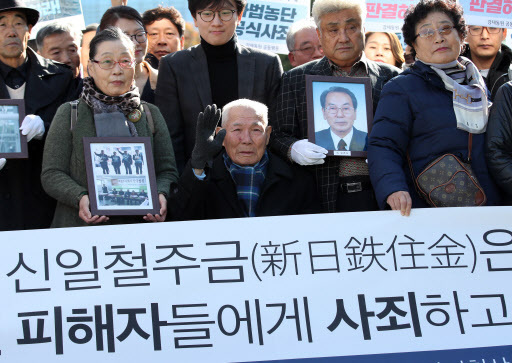Seoul is facing a tough task of respecting the country’s judiciary while mitigating diplomatic fallout with Tokyo in the wake of the Supreme Court’s decision that a Japanese firm should compensate four South Koreans forced into labor during Japan’s 1910-45 occupation.
The Supreme Court upheld on Tuesday the lower court’s ruling that ordered Nippon Steel & Sumitomo Metal Corp. to pay 100 million won ($88,000) each to the plaintiffs, who worked at its steel mills between 1941 and 1943, recognizing the victims’ individual rights for compensation despite a 1965 treaty.
The Supreme Court upheld on Tuesday the lower court’s ruling that ordered Nippon Steel & Sumitomo Metal Corp. to pay 100 million won ($88,000) each to the plaintiffs, who worked at its steel mills between 1941 and 1943, recognizing the victims’ individual rights for compensation despite a 1965 treaty.

South Korea and Japan are seen as trying to prevent the issue from hurting their bilateral relations amid shared efforts to achieve the denuclearization of the Korean Peninsula.
South Korea’s Foreign Minister Kang Kyung-wha and her Japanese counterpart Taro Kono stressed in a phone call the need to keep cooperating “for the future-oriented development of the relationship,” South Korea’s Foreign Ministry said.
Kono said the ruling undermines “the legal foundation” of the bilateral relations and signaled that Tokyo will take the case to the International Court of Justice. But he said Tokyo will wait to see how the Moon Jae-in administration will respond, calling on Seoul to take “firm and resolute” action over the ruling, according to Japanese media.
Now, the ball appears to be in the court of South Korea, which has pursued a two-track strategy of separating historical issues from their security and economic issues to develop “future-oriented” relations with Japan.
Seoul now faces three tasks: addressing the victims’ suffering by respecting the court decision, revisiting its own stance on the 1965 treaty and finding a diplomatic solution to prevent the issue from further hurting its relations with Japan.
Prime Minister Lee Nak-yon’s office said in a statement that South Korea “respects” the judiciary’s decision and it will draw up follow-up measures through a body comprising government officials and outside experts.
The South Korean plaintiffs could ask local courts to seize Nippon Steel’s assets in South Korea, which has been seen as a red line for the Japanese government. Under domestic law, the South Korean government cannot stop the court from executing its ruling.
For Japan, the verdict could open the floodgates for other victims and their relatives to file lawsuits against Japanese firms accused of using forced labor during the colonial era. There are 14 other cases pending at local courts, which are likely to be affected by Tuesday’s ruling.
According to government data, there were nearly 150,000 victims of wartime forced labor, 5,000 of whom remain alive, but families of those who have died could also make claims.
As the ruling contradicts South Korea’s earlier position that the issue of compensation for victims for forced labor had been settled under the 1965 treaty, Seoul will also have to revisit its own stance on the accord.
The bilateral treaty restored Seoul-Tokyo diplomatic relations and included a reparations package of $500 million in grants and low-interest loans, but the court said Tuesday that it had failed to address the illegality of Japan’s colonial rule.
Based on that, the court ruled that victims’ individual rights to redress for their suffering inflicted by illegal colonial occupation had not expired.
“There are differences in interpretations between South Korea and Japan on whether compensation for victims of forced labor by Japanese firms was included in the 1965 treaty. With the new ruling, the countries should adjust their stances,” said an international law expert, who wished to remain anonymous.
“After that, South Korea and Japan will be able to come up with alternatives -- such as a joint fund involving the two governments and Japanese firm,” he said.
The fund would involve the two governments and Japanese companies accused of using forced labor, as well as South Korean companies thought to have benefitted from Japanese aid under the treaty.
If they fail to reach a diplomatic agreement, the row between Seoul and Tokyo is expected to intensify.
“There is a possibility that Japan will not take the case to the International Court of Justice, depending on what follow-up measures the South Korean government will take and how much it takes responsibility,” commented Jin Chang-soo, senior researcher at the Sejong Institute.
“Under international law, Japan is not allowed to open the case with the ICJ unilaterally without South Korea’s agreement. But if South Korea doesn’t give consent to Japan for taking the case to the ICJ, it will greatly damage Seoul’s credibility,” he said.
“Resolving the issue through diplomatic consultations would be the best scenario. Japan will accept it if South Korea says it will compensate the victims instead,” he said.
(laeticia.ock@heraldcorp.com)
-
Articles by Ock Hyun-ju







![[From the Scene] Monks, Buddhists hail return of remains of Buddhas](http://res.heraldm.com/phpwas/restmb_idxmake.php?idx=644&simg=/content/image/2024/04/19/20240419050617_0.jpg&u=20240419175937)








![[From the Scene] Monks, Buddhists hail return of remains of Buddhas](http://res.heraldm.com/phpwas/restmb_idxmake.php?idx=652&simg=/content/image/2024/04/19/20240419050617_0.jpg&u=20240419175937)

![[KH Explains] Hyundai's full hybrid edge to pay off amid slow transition to pure EVs](http://res.heraldm.com/phpwas/restmb_idxmake.php?idx=652&simg=/content/image/2024/04/18/20240418050645_0.jpg&u=20240419100350)

![[Today’s K-pop] Illit drops debut single remix](http://res.heraldm.com/phpwas/restmb_idxmake.php?idx=642&simg=/content/image/2024/04/19/20240419050612_0.jpg&u=)